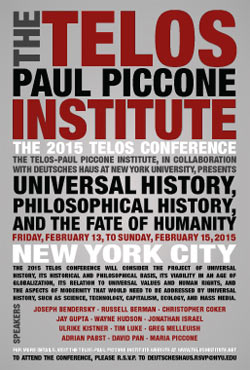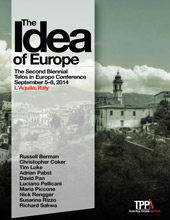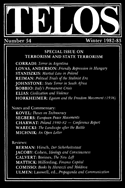 The worldwide reaction to the Charlie Hebdo attacks can be seen as a welcome indication of a global consensus concerning freedom of speech, individual rights, and opposition to Islamic fundamentalism. However, left-wing critics such as Noam Chomsky have criticized the worldwide demonstrations against the attacks as hypocritical because they ignore the more serious massacres that have been conducted by Americans with drone strikes and in military activities in Iraq, Serbia, and Syria. As Chomsky writes, “[a]lso ignored in the ‘war against terrorism’ is the most extreme terrorist campaign of modern times—Barack Obama’s global assassination campaign targeting people suspected of perhaps intending to harm us some day, and any unfortunates who happen to be nearby. Other unfortunates are also not lacking, such as the 50 civilians reportedly killed in a U.S.-led bombing raid in Syria in December, which was barely reported.” Such an equation of “their terror” with “our terror” is based on an image of a universal history in which all of mankind lives within a unified natural community and there is a single standard of measure that could be the basis of criminal behavior. We see this same approach in a more moderate form in Jack Miles’s similar exhortation that the proper response to ISIS and Al Qaeda is that “[y]ou are criminals and we send criminals to jail” rather than declaring a “war on radical Islam.” For both Chomsky and Miles, terrorist attacks count as criminal activity and should be equally condemned from the universal viewpoint of a peace-loving humanity. By diminishing the difference between criminal violence and war, they illustrate the basic tenet of a version of universal history—that all humans are linked together into a common set of natural laws and that such laws transcend historical and political differences. Every war in this perspective would be just as senseless and unjustified as any other form of murder. Teju Cole and Slavoj Žižek make a similar move when they indicate that there is something hypocritical about the support for Charlie Hebdo when other massacres, such as the one by Boko Haram in Baga, Nigeria, go unnoticed and unmourned.
The worldwide reaction to the Charlie Hebdo attacks can be seen as a welcome indication of a global consensus concerning freedom of speech, individual rights, and opposition to Islamic fundamentalism. However, left-wing critics such as Noam Chomsky have criticized the worldwide demonstrations against the attacks as hypocritical because they ignore the more serious massacres that have been conducted by Americans with drone strikes and in military activities in Iraq, Serbia, and Syria. As Chomsky writes, “[a]lso ignored in the ‘war against terrorism’ is the most extreme terrorist campaign of modern times—Barack Obama’s global assassination campaign targeting people suspected of perhaps intending to harm us some day, and any unfortunates who happen to be nearby. Other unfortunates are also not lacking, such as the 50 civilians reportedly killed in a U.S.-led bombing raid in Syria in December, which was barely reported.” Such an equation of “their terror” with “our terror” is based on an image of a universal history in which all of mankind lives within a unified natural community and there is a single standard of measure that could be the basis of criminal behavior. We see this same approach in a more moderate form in Jack Miles’s similar exhortation that the proper response to ISIS and Al Qaeda is that “[y]ou are criminals and we send criminals to jail” rather than declaring a “war on radical Islam.” For both Chomsky and Miles, terrorist attacks count as criminal activity and should be equally condemned from the universal viewpoint of a peace-loving humanity. By diminishing the difference between criminal violence and war, they illustrate the basic tenet of a version of universal history—that all humans are linked together into a common set of natural laws and that such laws transcend historical and political differences. Every war in this perspective would be just as senseless and unjustified as any other form of murder. Teju Cole and Slavoj Žižek make a similar move when they indicate that there is something hypocritical about the support for Charlie Hebdo when other massacres, such as the one by Boko Haram in Baga, Nigeria, go unnoticed and unmourned.
|
The recent protests of the deaths of Michael Brown in Ferguson, Missouri, and Eric Garner in New York City, both black males, at the hands of police, ignited what some believe to be a new movement in the vein of the historic black Civil Rights Movement of the 1960s. Little did Messrs. Brown and Garner know that their tragic deaths would breathe new life into a near-dead progressive Left. New groupings of Gen Xers and Millennials, networking through the Internet, have now displaced older activist groups led by the Rev. Jesse Jackson and the Rev. Al Sharpton. Other groups, like organized labor (especially SEIU), and perennial malcontents of Marxian legacy, such as the ANSWER coalition and the Revolutionary Communist Party, USA, have appeared in protests, alongside shadowy cadres of white anarchists, who in some cities have thrown firebombs and damaged property during protest actions. Unlike Occupy Wall Street and its derivatives, the new protest groups have an identifiable leadership, appear regularly in news media, and are building the road as they travel, that is, working out tactics and strategies based on their reading (or misreading) of past protest movements, as they go. As an occasional feature on TELOSscope, we highlight a past Telos article whose critical insights continue to illuminate our thinking and challenge our assumptions. Today, Yonathan Listik looks Norbert Elias’s “Civilization and Violence: On the State Monopoly of Physical Violence and its Infringements,” from Telos 54 (Winter 1982). |
||||
|
Telos Press Publishing · PO Box 811 · Candor, NY 13743 · Phone: 212-228-6479 Privacy Policy · Data Protection Copyright © 2025 Telos Press Publishing · All Rights Reserved |
||||
 As the first wars to be waged on European soil since the Second World War, the Balkan crises constituted a defining moment for post-Cold War Europe, and particularly for the newly united nation at its center: Germany. The political and humanitarian crises that ravaged the former Yugoslavia between 1991 and 1999 had a significant impact on migration patterns to Germany; the BRD took in 48% of all refugees from the war-torn region, vastly more than any other European country. This was not just a test of whether or not Germany would welcome migrants, a large portion of whom were Muslims. It was also a test of how Germany, in light of its own genocidal past, would react to the Serbian policy of “ethnic cleansing” and how it would treat its position in NATO, a membership that would cause the first mobilization of German troops since World War II. When we consider these various factors and dilemmas, Germany’s role in the conflict is certainly fraught, especially when we recall that the German government under Helmut Kohl and Hans-Dietrich Genscher exacerbated the Yugoslav crisis through its hasty recognition of Slovenia and then of its World War II ally Croatia as independent states. These decisions undermined the legitimacy of the Yugoslavian multiethnic state and set off a chain reaction that led first to the evacuation of Serbs from the new Croatian nation and eventually to the ethnic cleansing of Bosnian Muslims by Serbs.[1]
As the first wars to be waged on European soil since the Second World War, the Balkan crises constituted a defining moment for post-Cold War Europe, and particularly for the newly united nation at its center: Germany. The political and humanitarian crises that ravaged the former Yugoslavia between 1991 and 1999 had a significant impact on migration patterns to Germany; the BRD took in 48% of all refugees from the war-torn region, vastly more than any other European country. This was not just a test of whether or not Germany would welcome migrants, a large portion of whom were Muslims. It was also a test of how Germany, in light of its own genocidal past, would react to the Serbian policy of “ethnic cleansing” and how it would treat its position in NATO, a membership that would cause the first mobilization of German troops since World War II. When we consider these various factors and dilemmas, Germany’s role in the conflict is certainly fraught, especially when we recall that the German government under Helmut Kohl and Hans-Dietrich Genscher exacerbated the Yugoslav crisis through its hasty recognition of Slovenia and then of its World War II ally Croatia as independent states. These decisions undermined the legitimacy of the Yugoslavian multiethnic state and set off a chain reaction that led first to the evacuation of Serbs from the new Croatian nation and eventually to the ethnic cleansing of Bosnian Muslims by Serbs.[1]  Norbert Elias’s argument in “Civilization and Violence: On the State Monopoly of Physical Violence and its Infringements” is especially helpful for understanding the developments of terrorism, and it also applies to contemporary phenomena such as the war on drugs. He contends that placing the monopoly of violence in the hands of the state comes from a desire of harmonization. The assumption is that stability depends on an imposed self-discipline. That is, the state represents the interests of the collective and should provide for it. This is very enlightening considering the assumptions in the “war on drugs.”
Norbert Elias’s argument in “Civilization and Violence: On the State Monopoly of Physical Violence and its Infringements” is especially helpful for understanding the developments of terrorism, and it also applies to contemporary phenomena such as the war on drugs. He contends that placing the monopoly of violence in the hands of the state comes from a desire of harmonization. The assumption is that stability depends on an imposed self-discipline. That is, the state represents the interests of the collective and should provide for it. This is very enlightening considering the assumptions in the “war on drugs.” 

